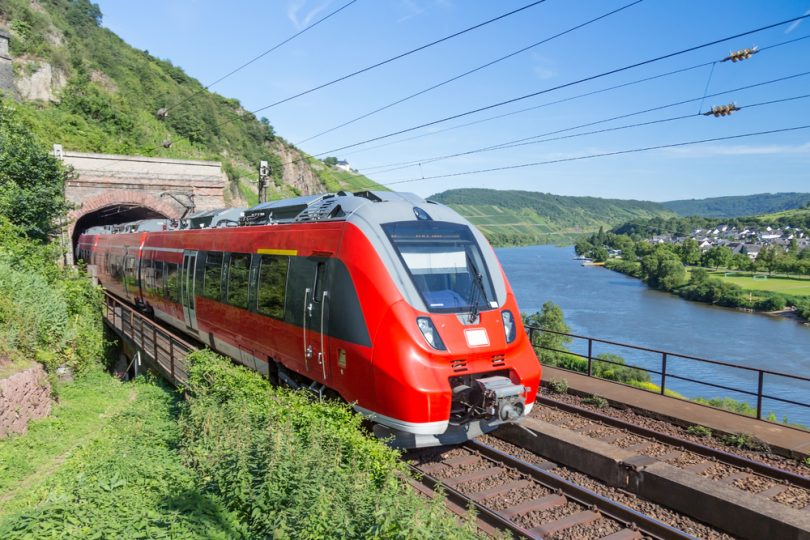You wouldn’t expect a giant railway company like Deutsche Bahn to be at the forefront of rolling out an innovation like blockchain. Normally, Deutsche Bahn outsources research and development for new technologies to universities and partners.
The digital subsidiary of Deutsche Bahn, DB Systel, has a department focusing on blockchain in diverse areas. The vision goes beyond hype, and they have projects in production.
Matthias Felder, Portfolio Manager, Blockchain & DLT Solutions at DB Systel spoke to Ledger Insights about both the vision and the projects.
Supply Chains and consortia
Felder believes that the customers at the top of the chain drive the technology in the supply chain. Consortia need to cover all types of transport, not just sea or road. The solutions need to be holistic.
“There are too many alliances, too many different solutions and too many different systems which are not working with each other. We currently don’t have a blockchain interconnection ecosystem,” said Felder.
“As the buyer of the goods, I don’t care that there are four systems or twenty systems. I just want to have one system where I can see everything belongs to my supply chain.”
“And the challenge will be, that if there are too many different kinds of systems without having a general standard set for how blockchain Supply Chain management systems should work, we don’t get the real benefits of all of the platforms we’re currently using. I guess it can take several years before this standard will appear.”
Consortia
One of the challenges for industries is what makes a good consortium. Felder told Ledger Insights that three things are needed for success:
1. You have to agree that it’s a shared data platform, even if your data is encrypted so competitors can’t see it. The mindset has to be to share data equally between all parties. That’s hard for a lot of companies.
2. You need a coopetition mindset. We are doing business with our competitors. Our competitor also gains the advantages we get from the system. If you only enter a consortium for your own company’s benefit it won’t work.
3. Felder emphasized that it’s his personal preference, but he’s a fan of small, focused consortia. In his opinion, some consortia end up doing too much talking and not enough action.
A consortium should have “good people and good companies in it, but should start small with a strict agenda and a strict roadmap.” Though the roadmap shouldn’t be too rigid.
Felder elaborated: “Even if it aims to be big, it really should start small, setting up the basics and then trying to grow and to bring more and more partners into it.” He emphasized that someone has to drive the consortium.
In the next year, Felder envisages additional new consortia emerging as well as consolidation with consortia merging.
Technology
DB Systel is creating standards across the group so that there’s consistency in the technologies they use.
The primary platform they’re using for permissioned ledgers is Hyperledger Fabric. The main challenge they’ve had is finding Go developers as most of their team are Java specialists.
They’re also discussing ideas with R3 / Corda, but there is no PoC yet.
The company uses the public Ethereum blockchain in some cases. For example, they are using it for researching mobility identity for travelers.
They’re experimenting with IOTA, but in Felder’s opinion, the technology is still at an early stage.
Projects
There’s the recently announced consumer transport or mobility platform with IBM. But DB Systel also has multiple projects that are beyond Proof of Concept, some live, some pilot projects.
Energy project
An energy trading blockchain launched in June 2017. Deutsche Bahn is the 5th largest producer of energy and the biggest energy consumer in Germany.
So when the weather is good, they generate surplus energy from solar and wind and sell it on to large B2B customers. When the weather is bad, they are a net consumer.
The process of collecting data from internal and external customers is stored on the blockchain so all parties can monitor and audit the process. It’s more transparent, including for external customers. This project is in production.
In three months time, they will also be providing energy to consumers, so it’s important for it to be auditable.
Charity project
Deutsche Bahn has a substantial logistics company. DB Systel wanted to demonstrate track-and-trace on a blockchain. So instead of doing a ‘can’t fail’ business project, they tried it for charity.
Usually, people donate clothes, and that’s the end of the story. They never know what happens to their donation.
For Christmas last year they created an app in the Google Play store called CharityChain. They partnered with charity ??? Convoy that sends clothing to the deprived in foreign countries like Montenegro, Serbia, and Bosnia.
People drop off clothes at their school, and a QR code is attached to the clothing. Via the phone app, the donor can then follow the item all the way to the destination, whether it’s on the road or passing a border.
The recipient, if they have access to a smartphone, has the option of taking a selfie while wearing the item and sending a thank you.
The feedback was sufficiently positive that they plan to relaunch the service for this Christmas with additional charities.
Contracting system
Deutsche Bahn is a massive business. There are 760 different companies in the group. A division can’t just go to DB Systel and say ‘fix my IT’. They have to have service level agreements and formal contracts between the companies.
There are eight different systems involved in the contracting process. The desire is to make this process easier, faster and more transparent.
The plan is to reduce it to two systems including the existing SAP system used for billing and payments. And a new blockchain system that is integrated with the SAP system so that there’s automatic reconciliation and it’s auditable.
For example, the blockchain system will trigger payment requests, but the SAP system will process the payments.
The project has gone beyond PoC and is currently being piloted between two divisions until August. One of the big questions is how do you decide if a pilot will go into production?
DB Systel sets KPIs for each project. Some are softer, like usability. But most are the standard: how much time can it save, how much money can it save, what’s the impact on total cost of system ownership? For example with any process automation, there can be an impact on headcount.
As this is an internal system, does it need a blockchain, couldn’t it be centralized?
If the pilot is successful, it potentially could be rolled out across the group. But the stage beyond that would be to roll it out to their suppliers and subcontractors. So blockchain makes sense.
Deutsche Bahn has many separate subsidiaries, which means data legally belongs to each subsidiary. So for large companies with many legal entities, blockchain is a good solution for sharing.
Conclusion
With DB Systel’s focus on action plus the clarity of vision and thinking, it’s likely we’re going to hear a lot about Deutsche Bahn blockchain projects in the coming months and years.






